The link between a Grindr murderer and a serial killer
- Published
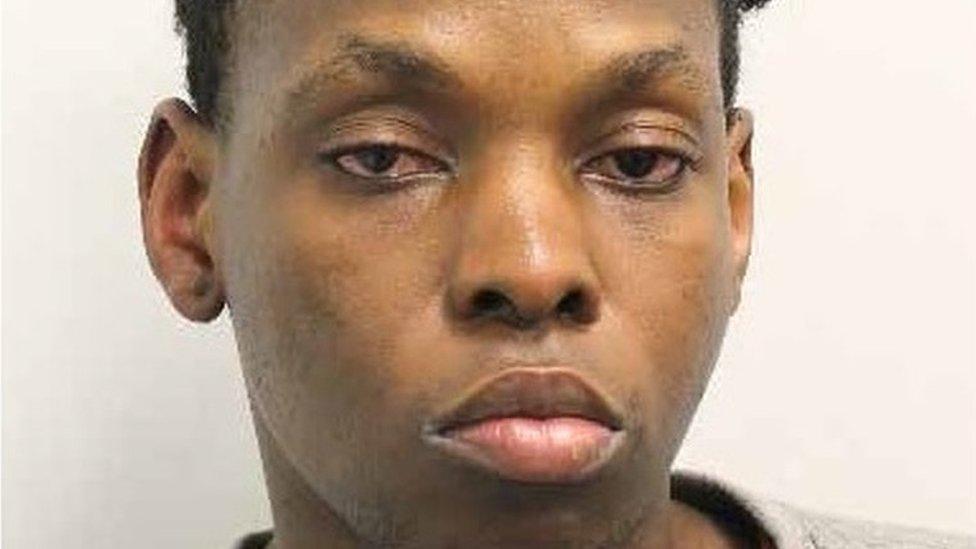
Gerald Matovu was a friend of the serial killer Stephen Port

Gerald Matovu has become the first person since the serial killer Stephen Port to be convicted of murder with a fatal overdose of the drug GHB.
The two killers had different motives - Port was a sexual predator, Matovu a prolific thief - but the same method: trawling gay dating apps such as Grindr, arranging sex, and then rendering their targets unconscious with surreptitious GHB doses.
What can now be revealed is that the pair were also close associates.
Matovu was arrested during the Port homicide investigation, and convicted of selling Port GHB. Matovu had actually drugged and stolen from the serial killer, and is suspected of being present at Port's flat when one of his surviving rape victims was drugged.
Port, from Barking, east London, was sentenced to life in 2016 for the murders of four men and the rape or sexual assault of several others, with the deceased all having been given catastrophic drug overdoses.
Local detectives failed to take a series of chances to catch him earlier, with the deaths not treated as suspicious until weeks after the final one.
After Port was imprisoned, Matovu drugged and robbed his way across London, which ultimately resulted in the murder of 54-year-old father of three Eric Michels.
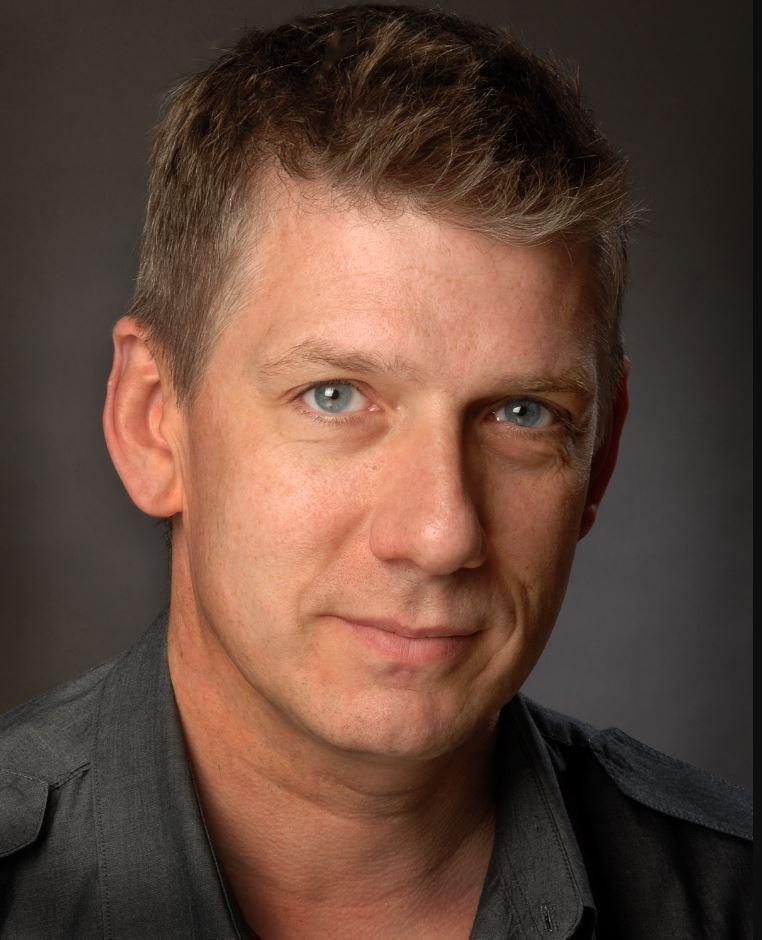
Eric Michels was described as an "adoring father"

His two sons are now calling for changes in how GHB is treated by the authorities.
The drug is used by clubbers and in so-called chemsex, but is frequently implicated in instances of date rape.
The brothers also question how Matovu's offending went unidentified despite several reports to police by his victims before the murder.
Eric Michels, originally from Portland, Maine, studied acting before moving to the UK in 1987.
He became a successful businessman, employed in a senior role at the energy company SSE, who sustained his love of showbusiness by using his spare time to appear in films and work as a magician.
Described in court as an "adoring father", the divorcé had came out as gay relatively late in life.
His two sons say their dad was caring, funny and loved by all.
Sam Michels said: "I'll never meet anyone like him ever again in my life and losing him has been like losing a limb", while his brother Josh described the devastation as "unbelievable".
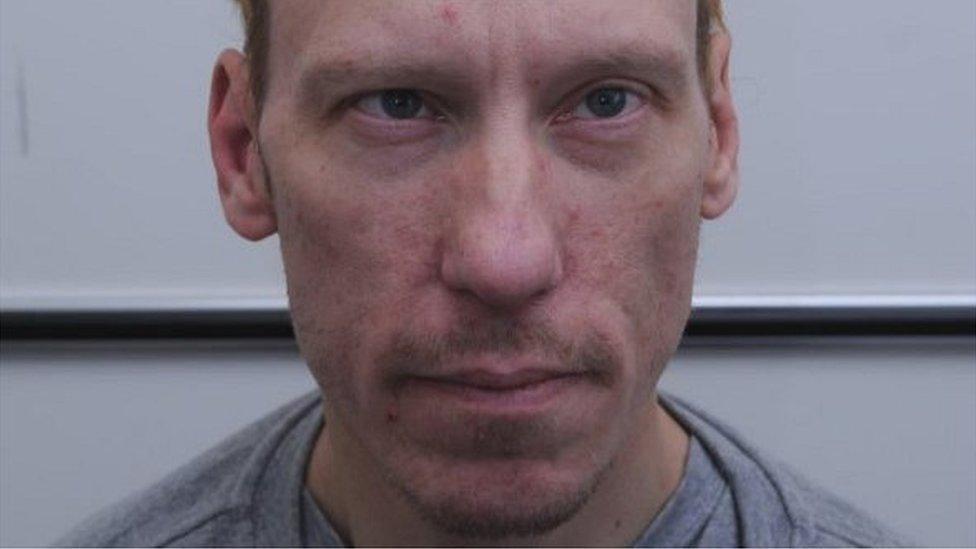
Stephen Port is serving a whole-life sentence for four murders
It was the evening of 16 August last year when their father encountered Matovu on Grindr, a location-based app that allows contact between users who are close to one another.
Mr Michels had been out in central London, visiting bars, when he began swapping messages with Matovu, who was at the Southwark hostel where he lived.
Sex was arranged, with Matovu taking an Uber ride with Mr Michels to his home in Chessington, south-west London.
CCTV images from a house opposite show them being dropped off soon after 2am.
At 11am Matovu emerged to meet a taxi, carrying a suitcase with which he had not arrived, briefly going back inside to collect several bottles of alcohol before being driven away.
Some time between those two events Matovu had administered a fatal overdose of GHB, using either a syringe - one was found at the scene - or by putting it in a drink.
Certainly by 6:47am - the time of his first digital picture - Matovu felt relaxed enough to spend hours taking photos of his host's bank cards and passwords, as well as accessing private accounts on his laptop.
Matovu then stole various possessions, including a mobile phone.
When Mr Michels' teenage daughter texted him that night she received no response.
Concerned, she texted again the next day and received a wholly uncharacteristic reply: "Hello hun im a little busy talk soon".
A strange male answered when she called asking for her dad and immediately hung up after she gave her name.
She went to her father's house, accompanied by her mother, and discovered his body.
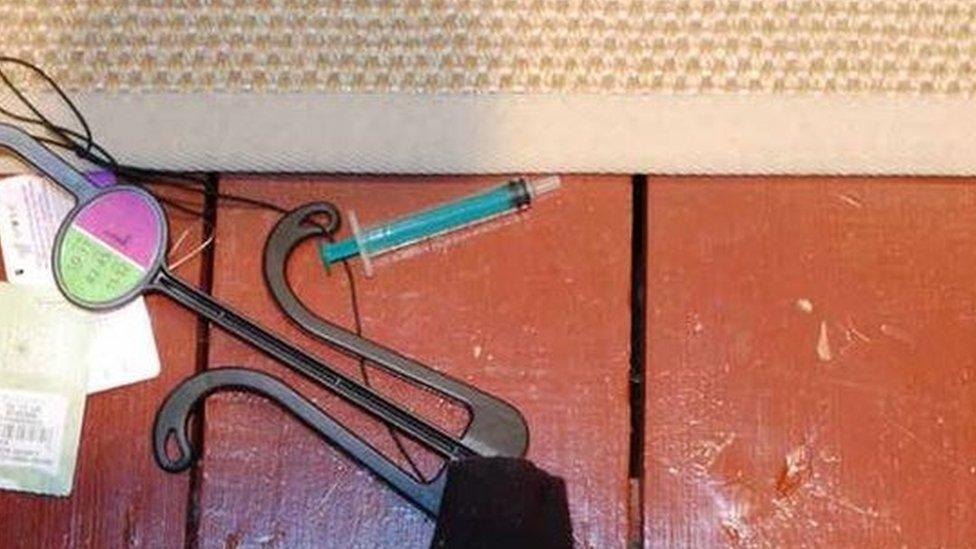
A syringe was found by police at Mr Michels' house
Police treated the death - which would eventually be attributed to GHB intoxication - as suspicious because of the stranger who answered the mobile.
Detectives linked Matovu to the events using mobile phone technology and decided to visit a flat in east London occupied by his lover Brandon Dunbar.
On arrival, they were met by a group of uniformed officers making inquiries in the aftermath of the discovery in the street of a bruised and naked unconscious man.
Matovu was inside, surrounded by stolen items belonging to a series of victims.
The thieves' digital devices contained pictures taken of credit cards and personal documents, which had been used to make various purchases.
They spent money using Mr Michels' bank cards, something Dunbar continued to do even after Matovu was arrested.
The naked man found in the street, who met the pair on Grindr, was injected with GHB, had his buttocks wounded with a blowtorch, was robbed, and then dumped on the pavement outside.
He was the last of at least a dozen people preyed on by Matovu, often operating in tandem with Dunbar, with eight of those having been drugged in the process.
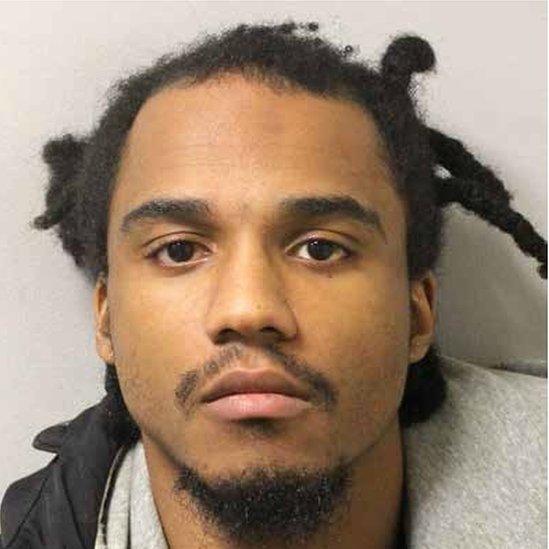
Brandon Dunbar is suspected of having been at Port's house when one of his victims was drugged

Five of the men called police to say what happened, but the response was limited and did not identify those responsible.
One had been drugged in his own home in December 2016 after inviting Matovu and Dunbar over, waking the next morning confused, drooling and hungover despite not having drunk alcohol for 10 years. The man's flatmate took a photo of the pair fleeing, with Matovu pictured wearing his victim's coat.
Another was told to go home when he called 999 after becoming the victim of a distraction theft at an east London property then occupied by Dunbar. A different Londoner later reported a similar theft at his flat involving Matovu.
A man from Kent, who had been drugged in his own home, called police to report being robbed following a visit by the two thieves.
Then, in May last year, a Dutch businessman attended an east London police station to report being drugged and robbed in his hotel room.
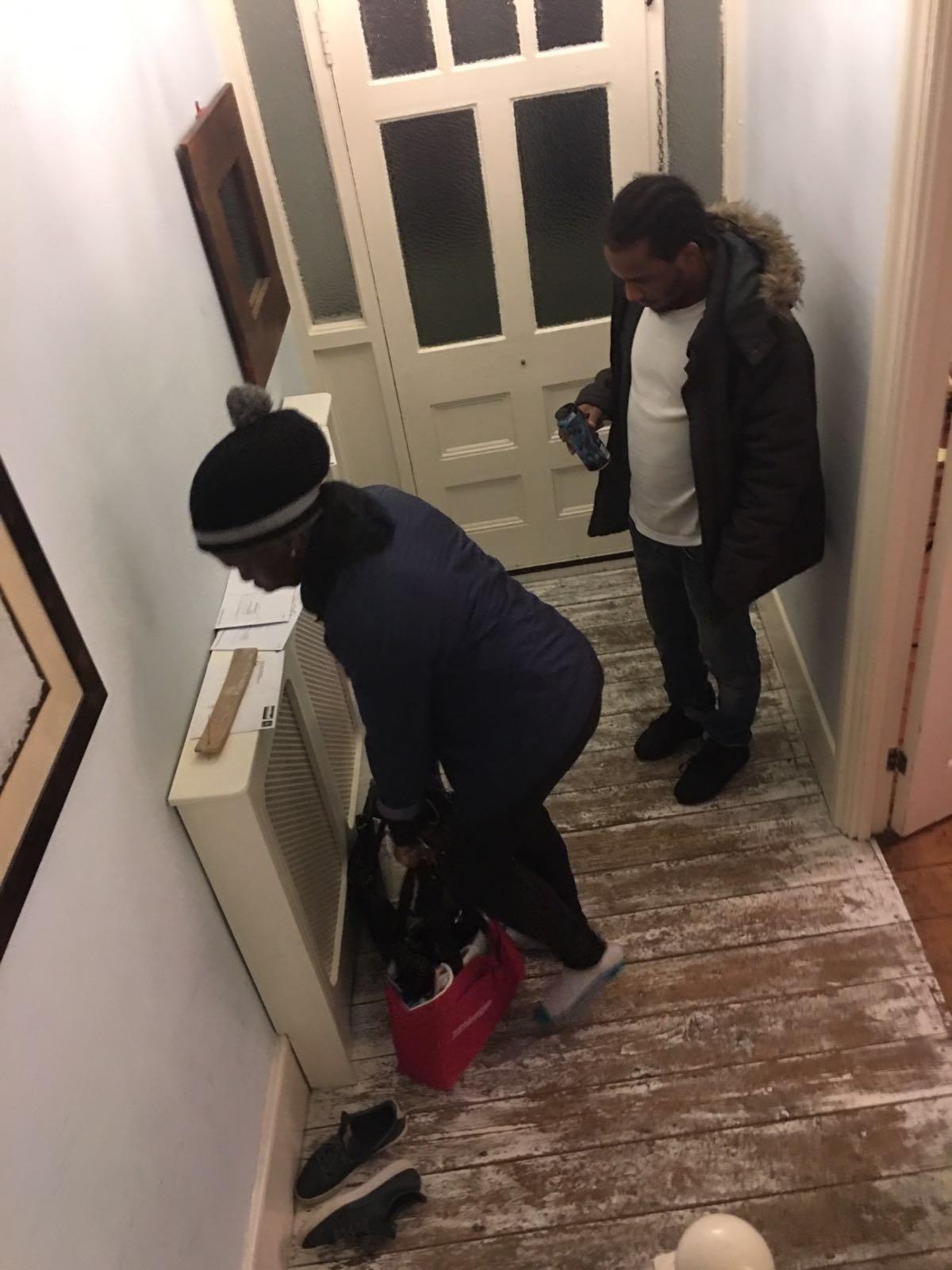
Matovu and Dunbar had their photo taken leaving the home of one victim

After drinking with a man from Grindr - now known to be Matovu - the next thing he recalled was waking in the early morning, unable to think properly, lying in a room stripped of all its effects.
Matovu had stolen his personal possessions, torn a television from the wall, and even taken the toilet brush.
A police officer advised him to attend hospital, which he did, before he returned to give a witness statement.
There was suspicious activity on his bank cards, with one taxi ride booked from Matovu's own street.
Despite the various investigative opportunities seemingly open to police, Matovu was not identified.
Scotland Yard said, following the Port case, processes were put in place for "frontline and investigating officers on how to best respond to allegations of drug-facilitated sexual assault or sexual assault following chemsex".
It added: "Matovu and Dunbar's series of offences was different - drugging men to steal from them - and dealt with in the first instance by local police as theft. As with any major case, we will review the sequence of events to ensure each matter was properly investigated to identify any learning for the future."
Matovu already had a criminal record and was known to be dangerous, in contrast to the online image he projected of a flamboyant "visual artist" who dreamed of being a model or television presenter.
In July 2016 he was jailed for 18 months for using a hammer to attack and wound a one-time associate, but time spent on remand meant he was soon free.
Then, in April 2017, he was sentenced to community service - despite having been convicted of drugs offences in the past - after admitting he had sold and offered GHB to Stephen Port.
Detectives investigating Port had uncovered incriminating messages between the two men.
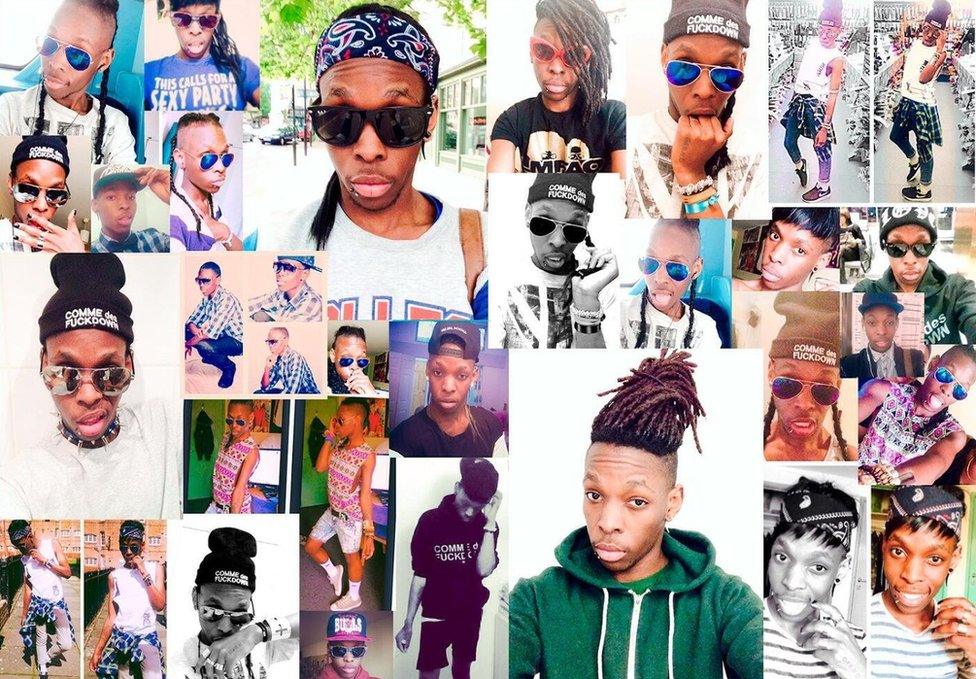
A collage Matovu used to promote himself on social media
The correspondence also showed Matovu and Dunbar had drugged the serial killer and stolen items from his flat.
In garbled texts from October 2015, only days before his arrest for the four murders, Port messaged Matovu to say: "Just get my stuff back or you will be taking the rap from police".
"You gave me the pill knowing quite well its perpose", Port informed him.
When Matovu asked "Please tell me u dropped the charges babes! I'm sorry," Port responded, "Yes l did but l hope you dont do that again to anyone as its not only dangerose to give a mix of pills to someone but to then take there stuff is criminal".
"I'm soo sorry and feel terrible I still want you to be my friend! X", Matovu replied.
Port's many victims were lured to his flat and given forced or surreptitious GHB doses, which allowed him to engage in his fetish for raping and sexually assaulting unconscious men.
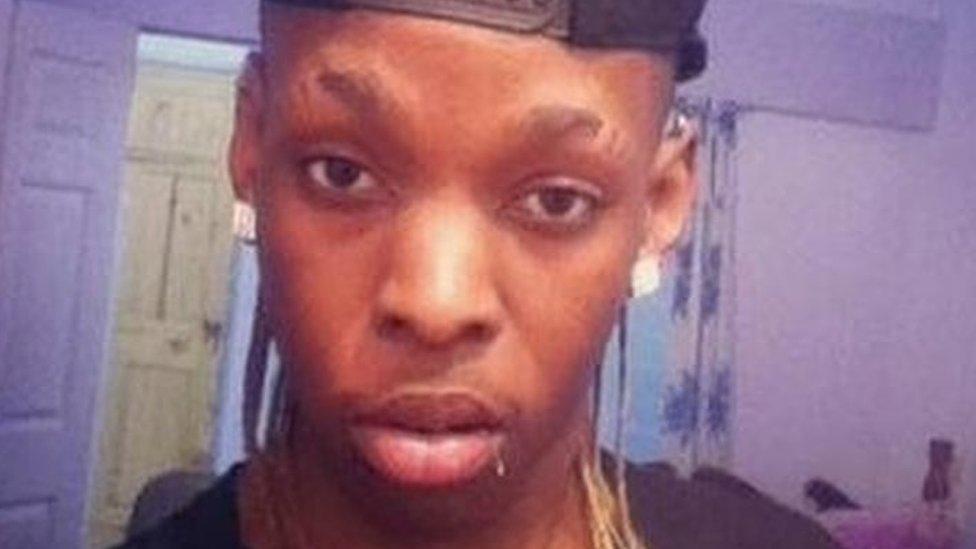
Matovu claimed Mr Michels used his own supply of GHB and then fell asleep

Although he killed alone, he was part of a network of people involved in so-called chemsex, which involves the use of drugs to facilitate sexual activity.
Five Port associates, including Matovu, were arrested during the murder inquiry.
One other drug dealer was jailed, with the further arrestees all held on suspicion of sexual offences, although none was convicted.
Two had been charged - one with rape, the other with voyeurism - in relation to a video of an unconscious male being penetrated by the killer and the other alleged rapist while the third man watched, but the case was dropped after the complainant became the only person Port was cleared of raping.
A person he was convicted of both drugging and raping - who visited the Barking flat in August 2015 - told Port's trial that two black men, including a drug dealer claiming to be a nurse, arrived at the address shortly before he was forcibly injected with a syringe, which happened while the visitors were in another room.
Matovu - who often described himself as a nurse - and Dunbar are suspected of the being the pair.
The victim described how, as he became dizzy but before he fell unconscious, Port permitted one of the men to join in with some sexual activity.
Neither Matovu nor Dunbar was charged with any offence in connection with the incident.
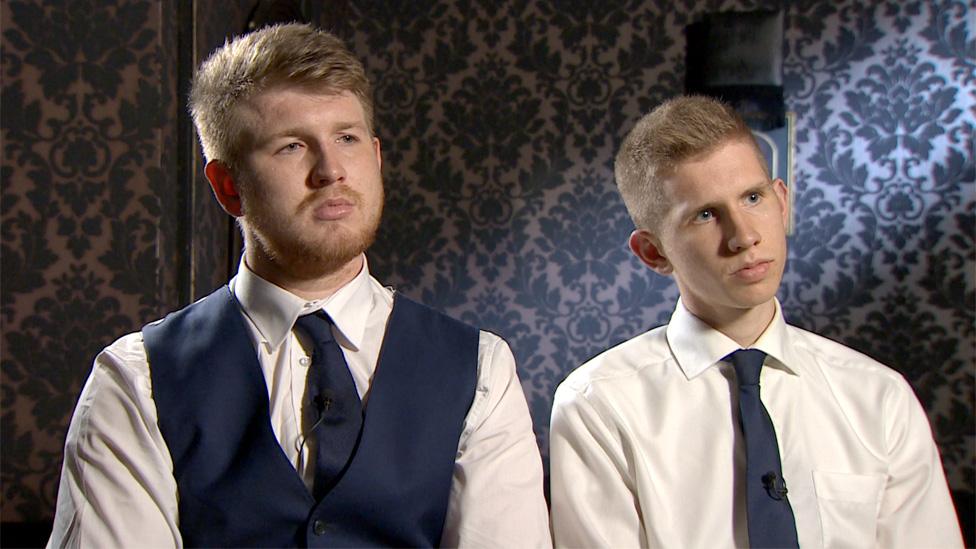
Josh and Sam Michels want all crimes relating to GHB to be investigated in full
At his murder trial, Matovu accepted going to Chessington with Mr Michels to have sex, but denied administering GHB, claiming the dead man used his own supply and then fell asleep.
He admitted a series of thefts, including from Mr Michels, but denied drugging anyone surreptitiously.
However, he wilted under cross-examination, failing to explain earlier inconsistent statements or how he could have believed Mr Michels was merely sleeping while he spent hours taking photos and selecting what to steal from his victim's home.
The Port and Matovu cases illustrate the danger posed by those who effectively weaponise GHB, as well as the inherent risks associated with its use.
Jonathan Rees QC, who prosecuted both murder trials, did not do so on the basis that either man meant to kill when administering GHB, but rather intended to cause "really serious bodily harm" by placing people in drug-induced comas.
Both men knew the jeopardy they were creating, Port progressively so as he killed again and again, Matovu fully aware of everything done by his friend.
Det Insp Mark Richards, who led the Matovu inquiry and worked on the Port one, said "GHB in itself, without using it as a weapon, is an incredibly dangerous drug."
He added "tiny amounts can kill" and it can place you into a "deep unconsciousness, messing with your central nervous system, and that unconsciousness has caused respiratory failure and death on many, many occasions".
Originally produced for medical purposes, GHB is a Class C prohibited drug that comes as a colourless and odourless liquid or a powder that is usually dissolved in water.
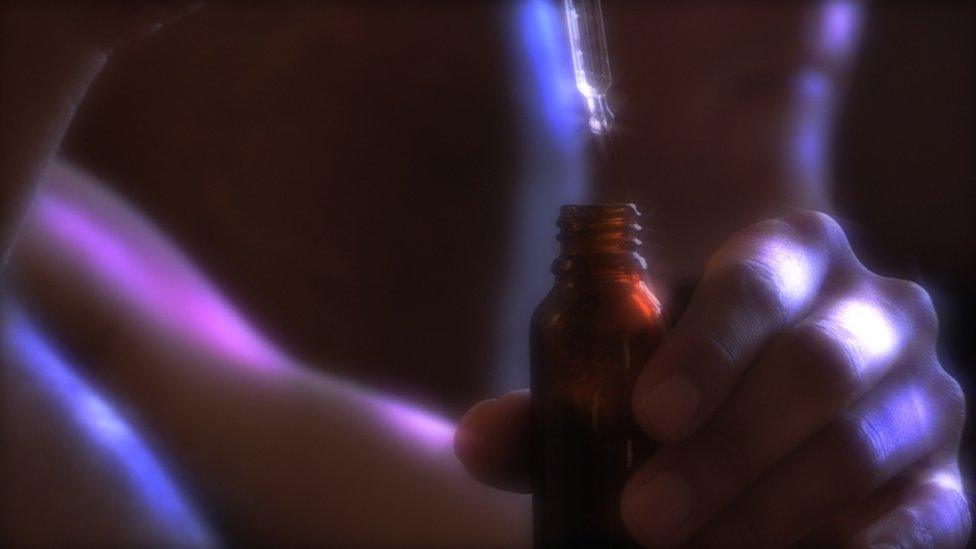
GHB is sometimes referred to as "liquid ecstasy"
It is closely related to GBL, sold as an industrial cleaner, that converts to GHB in the body and is only classed as a controlled narcotic when it is knowingly intended for human consumption.
GHB - sometimes referred to as "liquid ecstasy" - can lead to feelings of euphoria in very small doses, but in only slightly larger amounts can cause unconsciousness and death.
It is not routinely tested for after death or even when people think they may have been drugged.
In the Matovu case, for example, the Dutch businessman who was drugged in his hotel did not have a sample taken at hospital even though staff acknowledged it might have helped the police.
Mr Michels' sons want all crimes relating to GHB to be investigated in full.
They also hope for greater public awareness of the drug and would like to see it reclassified.
Sam Michels said: "Anything involving GHB in the future should be taken very, very seriously and investigated every time."
He added: "I didn't know what GHB was before any of this happened and so everything I've discovered about what it could do to people - rendering them unconscious and how it can be used against them - has been news to me."
Josh Michels argues it should be at least a Class B drug, recalling "when we found out it was a Class C and such a minuscule amount can do so much damage, we were quite shocked".
He believes that Matovu - a "complete and utter coward" - could have been stopped after the earlier reports about people being drugged and stolen from.
"We definitely think there could have been more done to prevent this from happening. When it was reported the first time it should have been followed up a lot more, I think, and especially when it happened the second, third, fourth time."
He thinks the fact Matovu was quickly arrested after the murder shows he could have been identified: "It's just a shame my dad had to die for them to go and find him, basically.
"We don't want any family to go through this ever again."